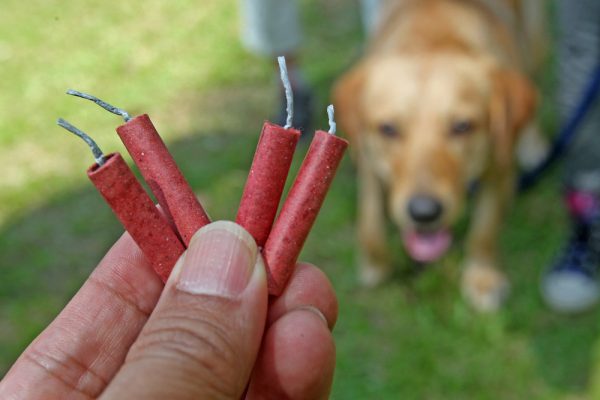New Year’s Eve is a time to celebrate and welcome the new year ahead, but this day can cause a lot of stress and dangers for our pets. So, how can you keep your pets happy and safe during this exciting night?
Remember that animals are more sensitive to loud noises than humans, which means that many pets are afraid of fireworks, loud music, and the bustle of large crowds. Certain foods, drinks, and decorations at your gatherings can also cause trouble for your cat or dog as well. It is hard to keep pets safe during holiday celebrations, but VRC is here with a few tips for pet safety during the New Year’s festivities.
1. Leave your pets home
If you are taking your celebration outside of your home, it is best to leave your pets behind. At home, your pets feel safe and secure. Since it is likely to be loud outside, VRC recommends leaving your pets in a quiet area of your home. If your pet is especially fearful of loud noises, it may be a good idea to have some familiar noises playing to drown out the scary sounds. Comforting music or the television can help make your pet feel less anxious while you are away.
2. Keep your pets inside
Dogs and cats may try to run or escape when they are frightened. Keeping your pets indoors as much as possible can prevent them from getting out and lost. VRC also advises you to keep windows closed and watch the door leading outside closely to make sure your pet doesn’t escape.
If possible, you may even want to keep your pets in a separate room away from all the festivities. Not only will this keep them from dashing out the door, but it can also prevent them from ingesting things that they shouldn’t and keep them calmer.
Keep your pet leashed if you need to take them out for a bathroom break—even if you have a fenced-in yard. A leash will give you more control if your pet is spooked. You may even want to use a harness instead of a collar that your pet may be able to slip out of. Keep in mind that during times of high-stress or excitement, pets can act in abnormal ways that you may not expect given their usual personality and demeanor.
3. Check and update information on your pet’s ID tag
Just in case your pet happens to get lost during New Year’s Eve celebrations, make sure all information on your pet’s ID tag is up-to-date. If your pet is microchipped, check the information on that as well. Even if your pet is microchipped, make sure that they are wearing an ID tag. It is better to be safe, and the more ways that someone can contact you, the more likely you are to find your pet.
4. Keep alcohol and food out of reach
Alcohol is very dangerous—even in small amounts—to cats and dogs. If you are celebrating the New Year with alcohol, keep it out of reach from your pets. Since alcohol is toxic to cats and dogs, it can cause drooling, dry heaving, vomiting, a distended abdomen, low blood pressure, weakness, and more, which could lead to coma or death.
A lot of people foods are dangerous for cats and dogs. During a party, it can be hard to watch your pet to make sure they aren’t getting into anything that could be harmful to them. Keep all food out of reach to prevent any problems. You may also want to speak to your guests and ask that they don’t feed your pet anything during the party.
Contact a veterinarian right away if you suspect that your pet has ingested alcohol or a problem food. Watch out for bones, fatty foods, chocolate, grapes/raisins, and other common foods that are toxic or harmful to pets.
5. Be mindful of decorations and party supplies
Streamers, balloons, confetti, and other party decorations can cause big trouble for our pets. They not only can cause an upset stomach, but they could cause an intestinal blockage or cause your pet to choke. If you think that your pet has ingested a foreign object, contact an emergency veterinarian.
6. Wear your pet out earlier in the day
Before the festivities begin, exercise or play with your pet. A tired pet is less likely to have built-up energy that can make them even more anxious. A tired dog or cat may just sleep through any of the stressors caused by New Year’s Eve celebrations, which makes your life much easier.
How Can You Manage Already Anxious Pets?
If your pet is already anxious, it may be a good idea to get anti-anxiety medications for your pet before New Year’s Eve. Set up an appointment with your veterinarian to see if anti-anxiety medications are something that your dog or cat could benefit from. Always speak to your veterinarian before giving your pet any medications, and only give your pet anti-anxiety medications prescribed and given out by a veterinarian. Many human medications are not suitable for pets and can be extremely dangerous.
It is also a good idea to try to maintain your pet’s normal routine as much as possible during the festivities. A routine can help reduce stress in pets. Make any necessary adjustments to keep your pets safe, however.
For anxious pets, following the advice listed above can be very beneficial. Creating a safe space for your pet that is away from noise, commotion, and other stressors can be the best way to manage an already anxious pet during the hustle and bustle of New Year’s celebrations.
What Should You Do If Your Pet Gets Loose?
Your natural instinct will be to chase your pet, but chasing a scared pet will only make them run more. Instead, grab some of your pet’s food or treats and try to call them back to you. You can also try to follow them with food or treats.
If you can’t manage to get your pet to come back to you, you can contact your local animal control officers for help.
What Should You Do If Your Pet Ingests a Dangerous Substance or Item?
Keep the phone number of an emergency veterinarian handy. If you believe that your pet has consumed a dangerous food item or something that isn’t food at all, give the emergency veterinarian a call. They can advise you on whether or not you need to bring your pet in.
Even if they don’t believe that the problem is serious enough for a visit to the veterinary ER, they can still walk you through how to make sure your pet is fine. If you notice any worrisome symptoms later, you should contact a 24/7 emergency veterinarian or go ahead and bring your pet into the ER.
VRC offers 24/7 emergency veterinary services to the Greater Philadelphia area 365 days a year. If you believe your pet needs emergency medical care this New Year’s, call VRC at 610-647-2950 or stop in, no appointment necessary.









 Email
Email



